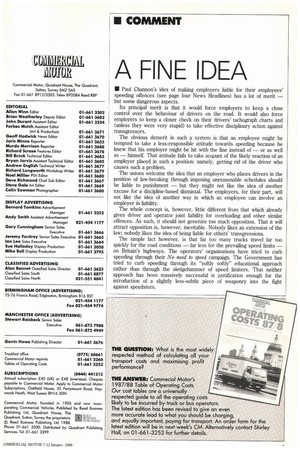A FINE IDEA
Page 5

If you've noticed an error in this article please click here to report it so we can fix it.
• Paul Channon's idea of making employers liable for their employees' speeding offences (see page four News Headlines) has a lot of merit — but some dangerous aspects.
Its principal merit is that it would force employers to keep a close control over the behaviour of drivers on the road. It would also force employers to keep a closer check on their drivers' tachograph charts and (unless they were very stupid) to take effective disciplinary action against transgressors.
The obvious demerit in such a system is that an employee might be tempted to take a less-responsible attitude towards speeding because he knew that his employer might be hit with the fine instead of — or as well as — himself. That attitude fails to take account of the likely reaction of an employer placed in such a position: namely, getting rid of the driver who causes such a problem.
The unions welcome the idea that an employer who places drivers in the position of law-breaking through imposing unreasonable schedules should be liable to punishment — but they might not like the idea of another excuse for a discipline-based dismissal. The employers, for their part, will not like the idea of another way in which an employee can involve an employer in liability.
The whole concept is, however, little different from that which already gives driver and operator joint liability for overloading and other similar offences. As such, it should not generate too much opposition. That it will attract opposition is, however, inevitable. Nobody likes an extension of the law; nobody likes the idea of being liable for others' transgressions.
The simple fact however, is that far too many trucks travel far too quickly for the road conditions — far less for the prevailing speed limits — on Britain's highways. The operators' organisations have tried to curb speeding through their No need to speed campaign. The Government has tried to curb speeding through its "softly softly" educational approach rather than through the sledgehammer of speed limiters. That neither approach has been massively successful is justification enough for the introduction of a slightly less-subtle piece of weaponry into the fight against speedsters.
































































